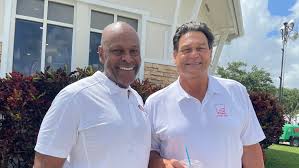Dwight Stephenson, a Miami Dolphins Hall of Famer, will not hold Marty Lyons accountable for his career-ending hit.
Dwight Stephenson, a Hall of Fame center for the Miami Dolphins, is widely regarded as one of the most talented and respected players in the history of the NFL. Known for his formidable skills on the field and his leadership off it, Stephenson’s career was tragically cut short due to a severe knee injury. While many players in similar situations might harbor resentment or anger toward the individual responsible for their injury, Stephenson’s attitude toward the hit that ended his playing days stands out. Despite the fact that it was a tackle by Marty Lyons, a former New York Jets defensive lineman, which ultimately led to the knee injury that forced Stephenson to retire, Dwight Stephenson has publicly stated that he holds no ill will toward Lyons. His decision to not hold Marty Lyons accountable for what happened is a reflection of his character, his understanding of the nature of football, and his ability to rise above personal adversity.
The Context of the Injury
To fully understand Stephenson’s stance, it is essential to first examine the context of the injury itself. On September 11, 1987, during a game between the Miami Dolphins and the New York Jets, Dwight Stephenson suffered a devastating knee injury that would end his illustrious career. The injury occurred when Marty Lyons, the Jets’ defensive lineman, made a tackle on Stephenson, twisting his knee in an unnatural direction. While the injury appeared to be a routine football play at the time, its aftermath was far from ordinary.
Stephenson had been a key player for the Dolphins since being drafted by the team in 1980, and by 1987, he was regarded as one of the best centers in the league. His ability to dominate in both the run and pass game, as well as his ability to read and react to defensive schemes, made him a fixture in Miami’s offensive line. His leadership was also a major factor in the Dolphins’ success during the early to mid-1980s. However, the knee injury he sustained on that fateful day effectively ended his career at the age of 28.
The hit by Marty Lyons, while not malicious, was a dangerous one. At that time in football, players were often taught to go after the ball carrier with reckless abandon, and knee injuries were not always seen as preventable or as serious as they are today. The tackle was one of those plays where the impact of the collision resulted in an injury, but it was also the type of hit that could have happened to any player in the game. Unfortunately, for Dwight Stephenson, it was a hit that altered the course of his career.
Marty Lyons’ Role
Marty Lyons, a defensive lineman for the New York Jets from 1979 to 1989, was known for his physicality and tough play on the field. A member of the famed “New York Sack Exchange,” Lyons was one of the prominent figures in the Jets’ defensive lineup during the 1980s. His role on the team was to disrupt the offense and get after the quarterback, a job that often led him into situations where he had to make split-second decisions on how to attack an opponent.
When it comes to the injury that ended Dwight Stephenson’s career, Lyons has maintained that it was simply a part of the game. In interviews after the fact, he expressed regret over the injury but emphasized that it was not intentional. He noted that in football, the goal is to hit the opponent in a way that stops the play, but injuries are sometimes an unavoidable consequence. Lyons, like many players, understood that football is a violent game where injuries can occur at any time, and that no one ever plays with the intent to harm another player seriously.
Although Marty Lyons’ role in the injury is undeniable, the nature of his involvement is not one that can easily be characterized as malicious or deliberate. The reality is that in the context of football, players are often forced into high-pressure situations where a single wrong move can lead to injury. Lyons was a defensive player, doing his job as part of the Jets’ defense, and he had no way of knowing that the result of his tackle would be the career-ending injury that it became.
Stephenson’s Perspective
Dwight Stephenson’s perspective on the injury and his decision to not hold Marty Lyons accountable for it speaks volumes about his character. Despite the severity of the injury, Stephenson did not choose to dwell on resentment or blame. Instead, he chose to focus on the positive aspects of his life and career. His approach to the situation demonstrates a level of maturity and understanding that goes beyond the typical reaction of most players in similar circumstances.
In interviews, Stephenson has consistently expressed that he does not blame Lyons for the injury. He has stated that football is a dangerous game, and injuries are an unfortunate reality that comes with the territory. While the loss of his career was heartbreaking for him personally, Stephenson was quick to acknowledge that no one player could be held accountable for something that is inherent to the sport. The physical nature of the game, with its inherent risks, is something that players accept when they step onto the field, and Stephenson’s decision to not hold Lyons accountable reflects that understanding.
Additionally, Stephenson’s decision may have been influenced by the respect he had for the game itself. Football, at its core, is a team sport, and players often forge close bonds with their teammates and even their rivals. It is clear that Stephenson understood that the nature of the game involves risks and that it was not a place for harboring resentment. In choosing to not hold Marty Lyons accountable, Stephenson showed a sense of grace and sportsmanship that is rare in competitive sports.
The Nature of Football and Accountability
The decision not to hold an opposing player accountable for an injury is one that speaks to a broader understanding of the nature of football itself. Football is a violent, physical sport, and players are constantly putting themselves in harm’s way. Injuries are a common occurrence, and most players understand that it is part of the risk they take when they step onto the field. The reality is that, in many cases, injuries occur not because of malice but due to the sheer speed and intensity of the game.
In some ways, Stephenson’s approach can be seen as a reflection of his belief in the larger principles of the sport. Football is a game that requires trust in your teammates, respect for your opponents, and an understanding that injuries are a byproduct of the game’s physical nature. Holding another player accountable for something that is essentially an occupational hazard in the world of professional football would not only be unfair but would also undermine the sense of camaraderie and mutual respect that exists between players, even those who play on opposing teams.
Moreover, the decision not to assign blame is also a way of taking responsibility for the situation in a broader sense. Dwight Stephenson did not want to dwell on the negative aspects of his injury or let it define his legacy. Instead, he chose to focus on his accomplishments, the positive impact he had on the game, and the lessons he learned from his experience. It would have been easy for Stephenson to lash out in anger or frustration, but his decision to rise above the situation and let go of any ill will shows a level of maturity and resilience that is often overlooked in sports narratives.
A Legacy of Grace and Sportsmanship
Ultimately, Dwight Stephenson’s decision not to hold Marty Lyons accountable for his career-ending injury serves as a testament to his character both on and off the field. Stephenson is remembered as not only a Hall of Fame player but also as a man who demonstrated grace, humility, and sportsmanship in the face of adversity. His legacy is one that transcends the football field, as he became an example of how to handle difficult situations with dignity and understanding.
In an era where athletes are often expected to display toughness, aggression, and a “win-at-all-costs” mentality, Stephenson’s approach to his injury and his decision not to assign blame to Marty Lyons is a refreshing reminder that there is more to sports than just physical dominance. It is about how athletes handle the challenges that life throws at them, both on and off the field.
In the end, Dwight Stephenson’s decision to not hold Marty Lyons accountable for the hit that ended his career is a reflection of the values he held dear: integrity, respect for the game, and the belief that football, while dangerous, should never be a vehicle for personal animosity. His choice to take the high road in this situation has only served to enhance his legacy as one of the NFL’s true gentlemen, a player who exemplified the best of what the sport has to offer.



